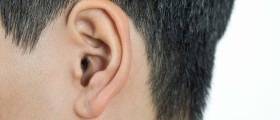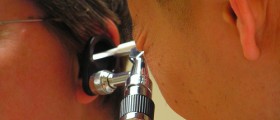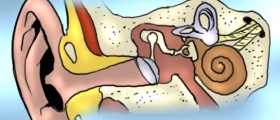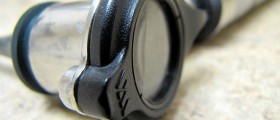
Ringing in one's ears, medically known as tinnitus, is a symptom of certain medical conditions. Apart from ringing patients commonly report buzzing, whistling, hissing or crackling sounds. A variety of noise is reported and they range from minor to debilitating forms. The symptom is very unpleasant and can significantly interfere in every day activities. The problem is either intermittent or continuous.
Causes of Tinnitus
There are many conditions associated with tinnitus. For example, the symptom may occur due to ear wax or foreign body in the external ear canal. Furthermore, build-up of fluid, puss etc. in the middle ear can, among several problems, cause ringing in the ears. Still, one of the most common causes of tinnitus is damage to the microscopic endings of the hearing nerve. This problem is reported in older people and is generally accompanied by a certain amount of hearing nerve impairment.
Tinnitus also affects people exposed to loud noise (people who work in factories, people who listen to loud music etc.). In some cases tinnitus develops as a consequence of certain medications or is one of the features of ear disorders (Meniere's disease). And finally, ringing in the ears develops due to an aneurysm or acoustic tumor.
Evaluation of Tinnitus
In order to establish the underlying cause of tinnitus doctors (otorhinolaryngologists) investigate patient's medical history, perform examination and a series of special tests. Majority of patients require audiogram, a hearing test that provides with additional information about hearing impairment.
If a doctor assumes the patient is suffering from a tumor he/she performs additional examinations including the auditory brain stem response (ABR), computerized test of the hearing nerves and brain pathways, head CT scan or MRI.
Treatment for Tinnitus
After careful and thorough evaluation and proper diagnosing of the underlying condition the doctor chooses the most convenient treatment. Unfortunately, there is no specific treatment for tinnitus. The symptom can be brought under control if the primary disease that has led to tinnitus in the first place is completely cured. In case the damage to the hearing nerve is irreversible patients may permanently suffer from tinnitus.
Prevention of Tinnitus
In some cases tinnitus can be successfully prevented. For example, one should never put cotton swabs deep in the ear. This can lead to ear wax build-up and subsequent tinnitus. People who are professionally exposed to loud noise must wear protective ear plugs or earmuffs and are supposed to undergo routine hearing examination. And those who enjoy loud music should think twice before they continue with such habit.

















Your thoughts on this
Loading...